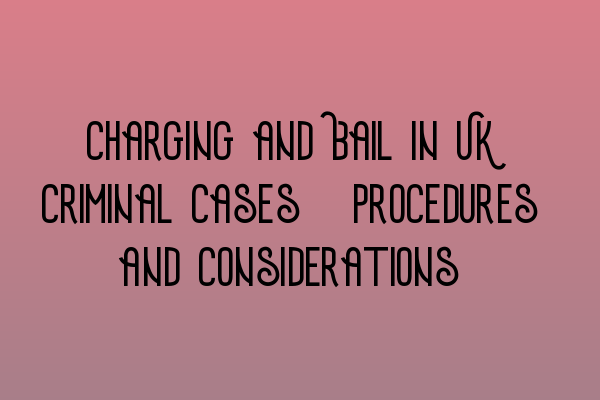Welcome to the SQE Criminal Law & Practice Law UK blog! In today’s post, we will be discussing the procedures and considerations relating to charging and bail in UK criminal cases. Understanding these processes is crucial for both solicitors and individuals involved in criminal matters, as they play a significant role in the overall legal proceedings.
The Charging Process
When a person is suspected of committing a criminal offense, the police or relevant law enforcement agency carries out an investigation to gather evidence. If there is sufficient evidence to suggest that a crime has been committed and the suspect is responsible, the police may decide to charge the individual. The charging decision is made based on the Code for Crown Prosecutors and is subject to the evidential and public interest tests.
It’s important to note that the decision to charge lies with the police, and not the prosecution. Once charged, the case is typically passed on to the Crown Prosecution Service (CPS), who will then review the evidence and determine whether to proceed with the prosecution.
During the charging process, it is essential for solicitors to ensure that all relevant evidence has been properly obtained and assessed. This will help in building a strong defense or prosecution case, depending on their role.
Bail: The Basics
Now let’s turn our attention to the concept of bail, which is closely linked to the charging process. Bail refers to the release of an individual charged with a criminal offense, pending trial. When a person is charged, the police or CPS will need to decide whether to release them on bail or remand them in custody.
Being granted bail allows the accused to be released, provided they agree to certain conditions set by the court. These conditions can include regular reporting to the police, surrendering their passport, or living at a specific address. The purpose of bail is to ensure that the accused attends court as required and does not interfere with witnesses or commit further offenses.
There are instances where a person may be refused bail, such as when there is a significant risk of them absconding, interfering with the course of justice, or committing further offenses. In such cases, the accused is remanded in custody until their trial.
Considerations for Solicitors
As solicitors, navigating the charging and bail processes requires careful consideration and attention to detail. It is crucial to review the evidence thoroughly and identify any potential weaknesses in the case. This allows for effective representation and helps in determining the appropriate course of action.
Additionally, solicitors must be well-versed in the law and keep up with any changes or updates that may impact the charging and bail procedures. Staying informed ensures that their clients receive the best possible legal advice and representation.
When it comes to bail applications, solicitors play a significant role in presenting arguments to the court. They need to demonstrate why their client should be granted bail, addressing any concerns raised by the prosecution, and highlighting factors such as ties to the community, previous bail compliance, and ongoing cooperation with investigations.
Overall, the charging and bail processes are critical stages in UK criminal cases. By understanding the procedures and considering all relevant factors, solicitors can provide effective representation to their clients.
For more information on criminal law and related topics, be sure to check out our other informative articles:
1. Essentials of Consideration: Understanding the Backbone of Contracts
2. Express and Implied Terms in Contracts: Decoding Agreement Components
3. Mistake in Contract Law: Unraveling the Impact on Agreement Validity
4. Strategies to Study Contract Law Effectively: Maximizing Your Learning Potential
5. Assignment of Contracts: Rights, Obligations, and Legal Considerations
Thank you for reading and stay tuned for more informative articles on criminal law and practice!
